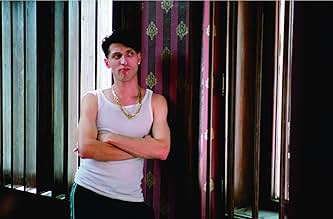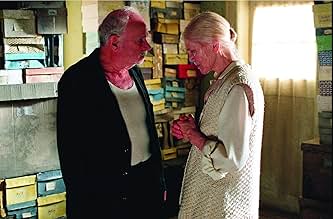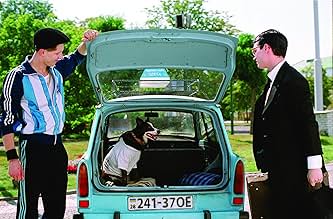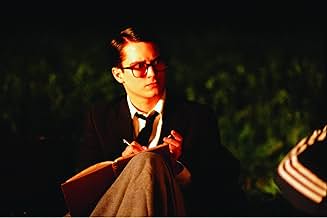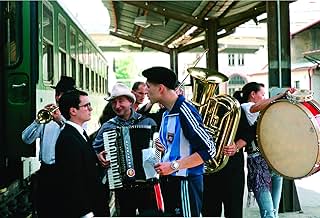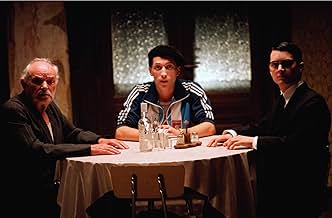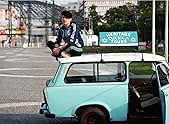Ajouter une intrigue dans votre langueA young Jewish American man, with the help of an eccentric local, endeavors to find the woman who saved his grandfather during World War II in a Ukrainian village that was ultimately razed b... Tout lireA young Jewish American man, with the help of an eccentric local, endeavors to find the woman who saved his grandfather during World War II in a Ukrainian village that was ultimately razed by the Nazis.A young Jewish American man, with the help of an eccentric local, endeavors to find the woman who saved his grandfather during World War II in a Ukrainian village that was ultimately razed by the Nazis.
- Réalisation
- Scénario
- Casting principal
- Récompenses
- 7 victoires et 6 nominations au total
- Grandfather
- (as Boris Leskin)
- Ukrainian Band Member
- (as Sergej Rjabcev)
- Ukrainian Band Member
- (as Jurij Lemeshev)
Avis à la une
Debut director/adapter Liev Schreiber retains some of the humor and language clashes of the novel, mostly through the marvelous Eugene Hutz as the U.S.-beguiled Ukrainian tour guide. He is so eye-catching that the film becomes more his odyssey into his country and his family as he goes from his comfortable milieu in sophisticated Odessa to the heart of a cynical, isolated land that has been ravaged by conquerors through the Communists and now capitalists, with both Jews and non-Jews as detritus. As funny as his opening scenes are when he establishes his cheeky bravura, we later feel his fish-out-of-waterness in his own country when he tries to ask directions of local yokels.
Shreiber uses Elijah Wood, as the American tourist, as an up tight cog in a visual panoply, as his character is less verbal than as one of the narrators in the book. He and Hutz play off each other well until the conclusion that becomes more sentimental in this streamlined plot. Once the grandfather's story takes over in the last quarter of the film, marvelously and unpredictably enacted by Boris Leskin, the younger generation does not seem to undergo any catharsis, as they just tidy up the closure.
Schreiber does a wonderful job visualizing the human urge to document history. One of his consultants in the credits is Professor Yaffa Eliach and her style of remembering pre-Holocaust shtetl life through artifacts clearly inspired the look and it is very powerful and effective.
The Czech Republic stands in for the Ukraine and the production design staff were able to find memorable symbols of change in the cities, towns and countryside, as this is now primarily a road movie, and the long driving scenes do drag a bit. Schreiber retains some of the symbolism from the book, particularly of the moon and river, but having cut out the portions of the book that explain those, they just look pretty or ominous for atmosphere and no longer represent time and fate.
As W.C. Fields would have predicted, the dog steals most of his scenes for easy laughs. In general, Schreiber does go for more poignancy than the book. It is irresistibly touching, especially for those who haven't read the book, but less morally and emotionally messy.
The film is enormously uplifted by its marvelous soundtrack, which ranges from songs and instrumentals from Hutz's gypsy band to traditional tunes to contemporary tracks to Paul Cantelon's klezmer fusion score.
This is not a Holocaust film per se, being a kind of mirror image of "The Train of Life (Train de vie)" as about memory of a time that is freighted with meaning now, but will resonate more with those who have an emotional connection to that history.
No spoilers here. The summary is, as IMDb describes, a young man's journey to the Ukraine to follow his roots and find the village where his father grew up.
The dialog is in English and Ukrainian (and Russian too, I believe). This allows for some wonderfully linguistically-based moments as one character interprets, more or less faithfully, for the English speaker in the group, depending on the circumstances.
The scenery is wonderful and the musical score is a treat with wonderful Eastern European influences. Be sure you stay through the credits for the final tune.
This is Lieve Schreiber's directorial debut and is well done. I give this film a 9, one of the best films I've seen in a long time. I recommend it highly.
Liev Schreiber makes his directorial debut with a playful angst usually associated with his acting ethos. When successful actors decide to sit in the director's chair, we usually get a biographical glimpse at the souls beneath the acting mask- Check. We usually get a mishmash of genres- Check. But what we normally do not get is an insightful original film which is credible, intelligent and moving.
Elijah Wood plays Jonathan, an inquisitive young boy who collects pieces of life as he goes. He is on a mission to find a woman in a photograph. The sepia picture bears his grandfather (an uncanny resemblance to him) and the woman. To aid his journey he enlists the help of travel guides that comprise of a Hip-Hop loving break-dancer, Alex (Eugene Hutz), his apathetic and perma-vexed grandfather (Boris Leskin) and his dog- Sammy Davis Junior Jr! What ensues is essentially a comedy. There is an un-patronisingly simple introduction with voice-overs. Alex's is especially funny as he educates his younger brother on the year 1969, proving how popular he is with the chicks and break-dancing thus setting him up as Jonathan's antithesis.
Schreiber begins to break down the characters as they progress and the comedy acts as an intentional veil to what is a story about three people linked to the holocaust who do not really know themselves. All three hold the film with tenderness and authenticity something Schreiber was unlikely to get wrong and as enchanting and fantastical as the film is, the horrors that are allowed to crack through, i.e. the past are presented in an almost palatable tone (incidental music, cinematography) which make them all the more unsettling.
As the unlikely group finally find the town they seek they learn of the true atrocities that occurred and find out a lot about who they really are.
Elijah wood is as authentic as usual, bringing his usual innocence and strength to the screen. Formally a resident good in Lord of the Rings and a resident evil in Sin City he plays Jonathan with aplomb as he is bombarded with culture shocks and a quest for truth. Boris Leskin as the grandfather also delivers his angst and frustration at the youths with great humour and conviction as his own past is unravelled. However, it is Eugene Hutz as Alex that makes the show. The director using that old trade of translation misunderstandings to create and maintain a humour that is actually funny and not gimmicky.
Schreiber has delivered an enchanting debut that has both heart and soul. The continuous score and beautiful photography creates a fairy tale haze around a story about identity, truth and family. If there was a complaint, it would be the speed at which the film changes direction; though this could have been intentional it may not sit well with all. Nevertheless this is a sterling effort that delivers great comedy and bonding between an unlikely group while dissecting another aspect of the horrors of World War 2 in a completely fresh fashion.
-Chi&Ojo
"Everything Is Illuminated" is a strange movie about a weird young man with the compulsive behavior of collecting souvenirs from his family to not forget them that seeks the past of his grandfather to understand how could be his life if his grandfather had not moved to USA. This bizarre vegetarian character meets a dysfunctional Ukrainian family that owns an amateurish travel agency specialized in helping Jews to find missing relatives, and together they have an almost surrealistic road-trip through the country of Ukraine. The movie begins like a comedy, with a sarcastic black humor, and ends in a touching and tragic drama recommended for specific audiences. My vote is seven.
Title (Brazil): "Uma Vida Iluminada" ("An Illuminated Life")
Le saviez-vous
- AnecdotesEugene Hutz's band Gogol Bordello appears as the polka band that greets Elijah Wood at the train station.
- GaffesWhen the Grandfather repeatedly sounds the horn of the car, he presses the middle of the steering wheel to do so. In the Trabant, the horn is activated by pushing the signal light lever forward.
- Citations
Alex: I have reflected many times upon our rigid search. It has shown me that everything is illuminated in the light of the past. It is always along the side of us, on the inside, looking out. Like you say, inside out. Jonathan, in this way, I will always be along the side of your life. And you will always be along the side of mine.
- Crédits fousSeveral songs are credited to the New York punk/Gypsy/Jewish klezmer band, Gogol Bordello, which is led by Eugene Hutz, who plays Alex in the film (the same band greets Jonathan when he arrives on the train). The last of these songs, "Start Wearing Purple (For Me Now)," which plays over the end credits, is credited to both a correct spelling (Gogol Bordello), dg and Gogol Bodello, an incorrect spelling.
- ConnexionsFeatured in Today: Épisode datant du 24 novembre 2005 (2005)
Meilleurs choix
Détails
- Date de sortie
- Pays d’origine
- Site officiel
- Langues
- Aussi connu sous le nom de
- Everything Is Illuminated
- Lieux de tournage
- Sociétés de production
- Voir plus de crédits d'entreprise sur IMDbPro
Box-office
- Budget
- 7 000 000 $US (estimé)
- Montant brut aux États-Unis et au Canada
- 1 712 337 $US
- Week-end de sortie aux États-Unis et au Canada
- 66 806 $US
- 18 sept. 2005
- Montant brut mondial
- 3 601 974 $US
- Durée
- 1h 46min(106 min)
- Couleur
- Mixage
- Rapport de forme
- 1.85 : 1


